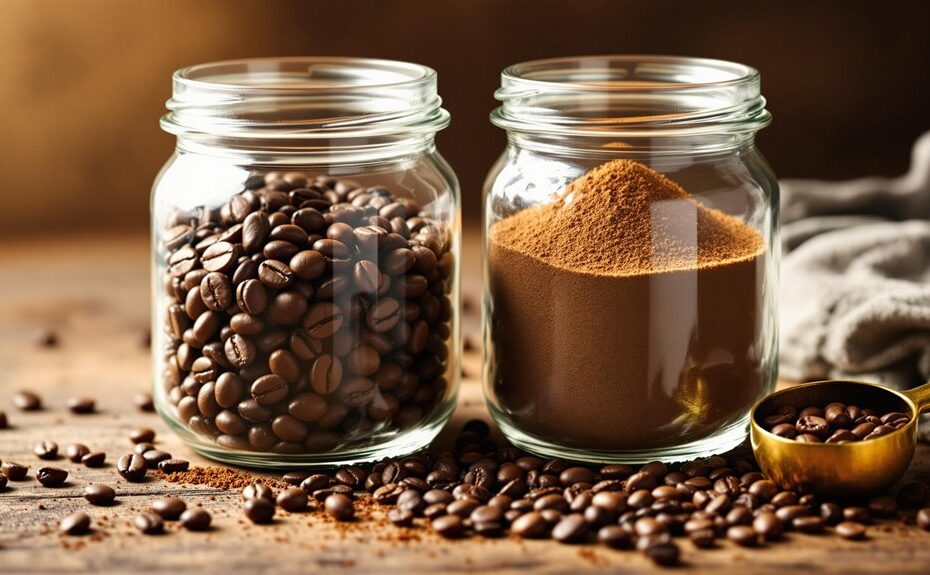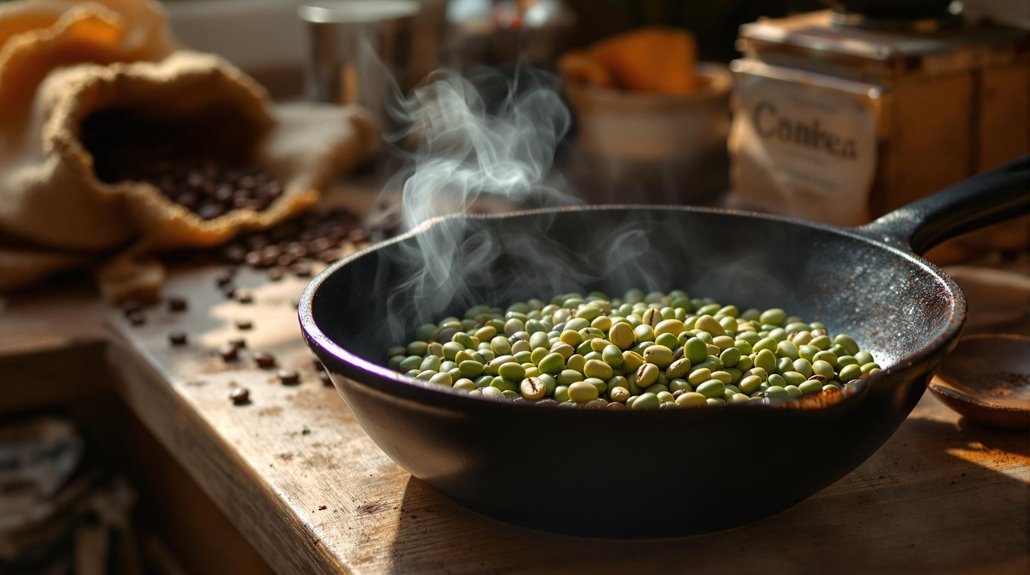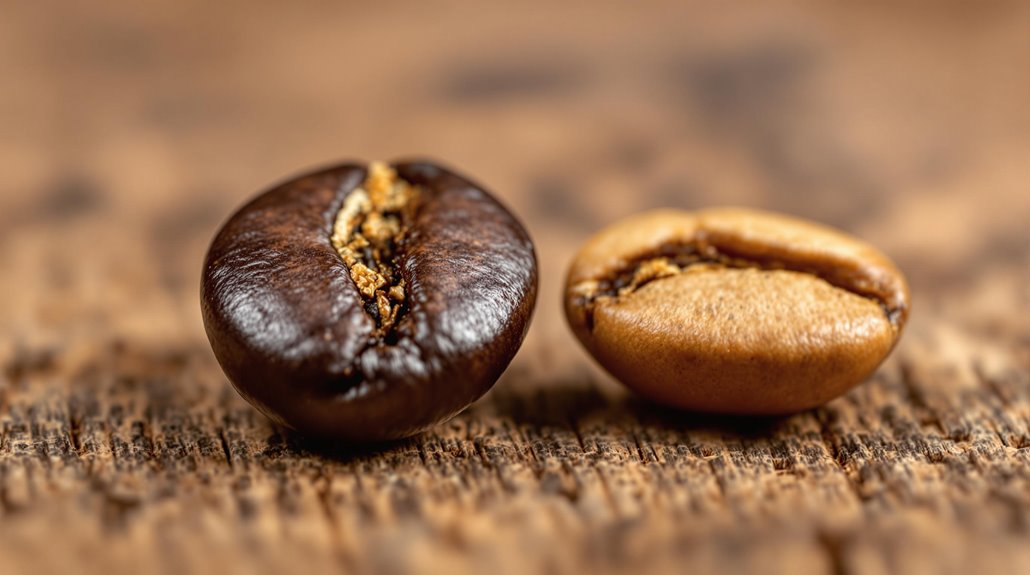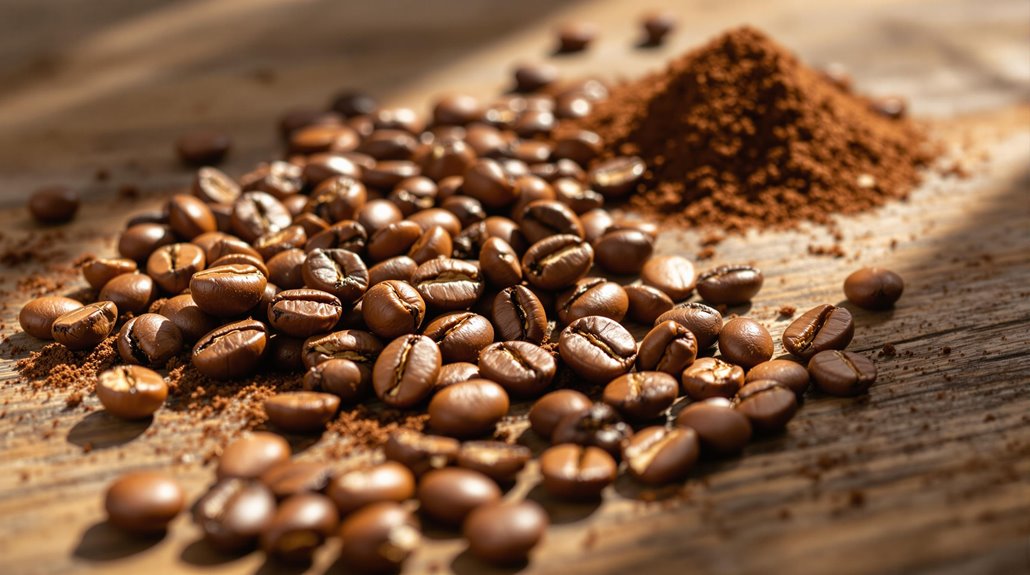







You've probably noticed how a freshly ground cup of coffee tastes richer and more aromatic compared to pre-ground options. Whole beans lock in those complex flavors, but they require a grinder and a bit more effort, while pre-ground coffee offers quick convenience at the cost of freshness. The choice ultimately depends on what you value most—time or taste. But there's more to ponder, like how storage, brewing methods, and even caffeine extraction play into your decision. If you're curious about which option aligns best with your coffee habits, the details might surprise you.
Key Takeaways
- Whole bean coffee retains peak freshness for 7-10 days post-roast, while pre-ground coffee loses freshness within 10 days due to oxidation.
- Freshly ground whole beans preserve aromatic compounds and natural oils, offering richer flavor compared to pre-ground coffee's flat profile.
- Whole beans allow grind size customization for optimal extraction, while pre-ground coffee's fixed grind size limits brewing method compatibility.
- Pre-ground coffee is more convenient for quick preparation, but whole beans provide better flavor control and flexibility for various brewing methods.
- Whole beans are ideal for infrequent drinkers, as they resist staling longer, while pre-ground coffee suits daily drinkers but degrades faster.
Freshness and Shelf Life Comparison
Whole bean coffee maintains peak freshness for 7-10 days post-roast, retaining its full flavor profile for up to 15-21 days, while pre-ground coffee begins to lose freshness within 10 days due to accelerated oxidation. When you choose whole beans, you're preserving the natural gasses and oils that protect the coffee's integrity. These compounds, trapped within the bean's cellular structure, slow down oxidation and maintain peak freshness longer. Pre-ground coffee, however, has a much larger surface area exposed to air, causing it to degas rapidly and lose its aromatic compounds within just 3 days of grinding.
To maximize shelf life, store your whole beans in an air-tight container away from light, heat, and moisture. This minimizes exposure to oxygen, which is the primary culprit behind flavor degradation. Pre-ground coffee, even in an air-tight container, can't compete with whole beans because the grinding process accelerates the breakdown of volatile organic compounds. If you need to extend freshness further, freezing whole beans in an air-tight container is a viable option, but avoid freezing pre-ground coffee as it risks flavor degradation. Visible lipids on whole beans also serve as a freshness indicator, something pre-ground coffee lacks due to its rapid oxidation.
Flavor and Aroma Differences
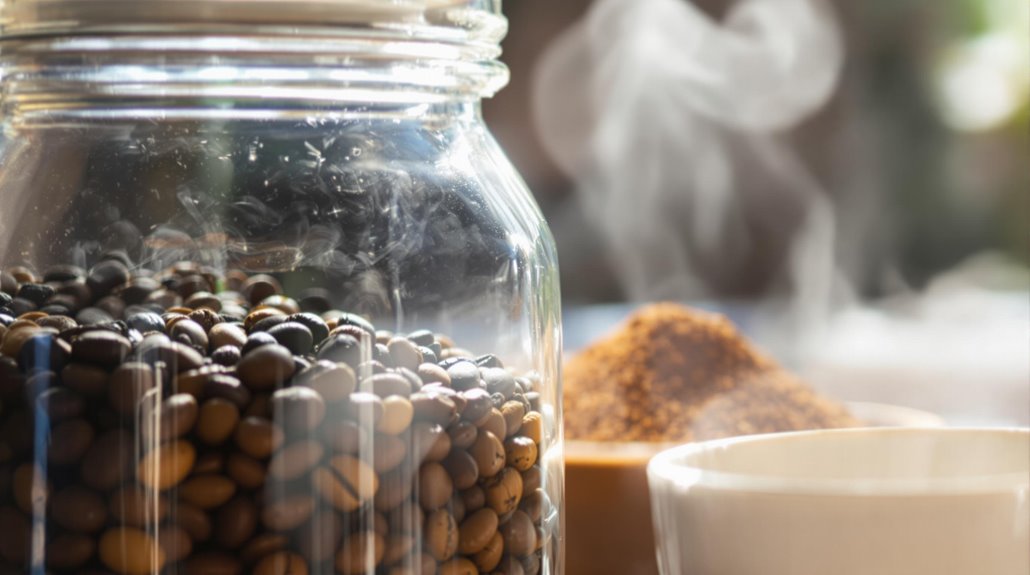
When you grind whole beans just before brewing, you preserve volatile aromatic compounds and natural oils, which amplify the coffee's brightness and complexity. Pre-ground coffee, on the other hand, oxidizes rapidly, losing up to 60% of its aroma within minutes and resulting in a flatter, less vibrant flavor profile. The difference in bloom intensity between freshly ground and pre-ground coffee further highlights how oxidation and staling diminish the sensory experience.
Freshness Impact on Taste
With every passing minute after grinding, coffee's flavor and aroma degrade due to oxidation, a process that accelerates substantially in pre-ground coffee. When you choose whole bean vs ground, you're directly impacting the flavor profiles of your brew. Freshly ground coffee preserves volatile compounds like natural sugars and acids, which are essential for a bright, complex cup. Pre-ground coffee, however, loses these compounds quickly, resulting in a flat, stale taste. The visible lipids on whole beans—indicators of freshness—also contribute to a richer, more vibrant brew compared to the muted flavors of pre-ground coffee.
Whole beans retain peak freshness for 1-2 weeks post-roast, while pre-ground coffee often degrades within 20-30 minutes after grinding. This rapid oxidation strips away the nuanced coffee tastes you'd get from freshly ground beans. Additionally, pre-ground coffee sold in stores is typically roasted weeks or months prior, further diminishing its quality. By grinding whole beans just before brewing, you release the full spectrum of flavors, ensuring a more robust and satisfying cup. The choice between whole bean and pre-ground coffee ultimately determines how much of the coffee's inherent character you'll experience.
Aroma Retention Comparison
Aroma retention in coffee hinges on the preservation of volatile compounds, which are far more stable in whole bean form than in pre-ground coffee. When you grind coffee beans, you exponentially increase their surface area, exposing them to oxygen and light, which rapidly degrade aromatic oils and lipids. Pre-ground coffee can lose up to 60% of its aroma within just 15 minutes of grinding, while whole bean coffee maintains its aromatic integrity for weeks if stored properly. The lipids and oils in whole bean coffee, critical for aroma, remain intact until grinding, ensuring a more robust and complex sensory experience during brewing. Studies show that coffee brewed from freshly ground whole beans contains 30% more aromatic compounds compared to pre-ground coffee stored for even a week. By choosing whole bean coffee, you preserve the volatile compounds that define its aroma, delivering a richer and more nuanced cup. Pre-ground coffee, while convenient, sacrifices this aromatic complexity due to accelerated oxidation and degradation. For the fullest aroma, always opt for whole bean coffee and grind it just before brewing.
Flavor Profile Variations
Preserving the intricate flavor profile of coffee begins with the choice between whole beans and pre-ground options, as the latter's accelerated degradation compromises both aroma and taste. Whole beans retain their natural oils and aromatic compounds, which are essential for a rich, complex flavor profile. When you grind whole beans just before brewing, you maximize the release of these compounds, resulting in a brighter, more vibrant cup with pronounced acidity and depth. In contrast, pre-ground coffee loses up to 60% of its aromatic compounds within minutes of grinding, leading to a flat, stale flavor that deteriorates further over time due to increased surface area exposure.
The grind size customization possible with whole beans also plays a critical role in flavor extraction. By adjusting the grind to suit your brewing method, you can achieve a balanced extraction that highlights the coffee's nuanced notes. Pre-ground coffee, however, is locked into a single grind size, often leading to over- or under-extraction, which dulls the flavor profile. For a truly dynamic and aromatic experience, whole beans are the clear choice.
Caffeine Content and Extraction
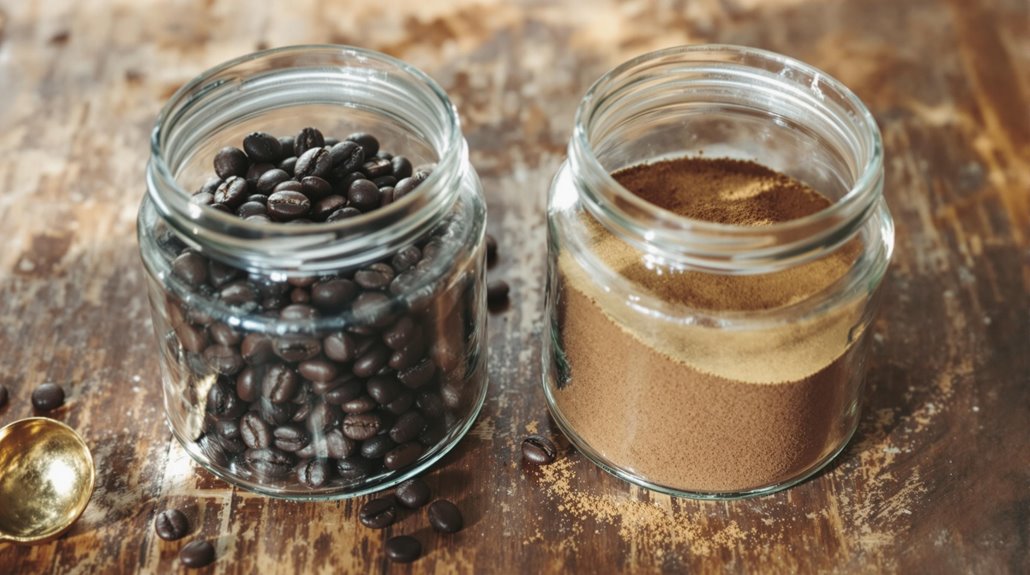
When considering caffeine content and extraction, it's important to understand that the type of coffee bean—Robusta or Arabica—plays a more significant role than whether the beans are whole or pre-ground. Robusta beans contain nearly twice the caffeine of Arabica, making them the go-to for higher caffeine content. Grinding coffee doesn't alter caffeine levels, but grind size directly impacts extraction efficiency. Finer grinds increase surface area, allowing water to extract more caffeine during brewing. Pre-ground coffee may lose minimal caffeine potency over time due to oxidation, but this is negligible compared to the freshness and ideal extraction you get from freshly ground whole beans. Brewing method also plays a critical role; espresso, for example, extracts more caffeine per ounce than drip coffee due to its high-pressure process. Freshly ground whole beans maximize caffeine extraction by ensuring the grind size is tailored to your brewing method, enhancing surface area exposure and preserving volatile compounds. Ultimately, while grind size and extraction efficiency matter, the bean type and brewing technique are the primary drivers of caffeine yield.
Convenience and Preparation Time
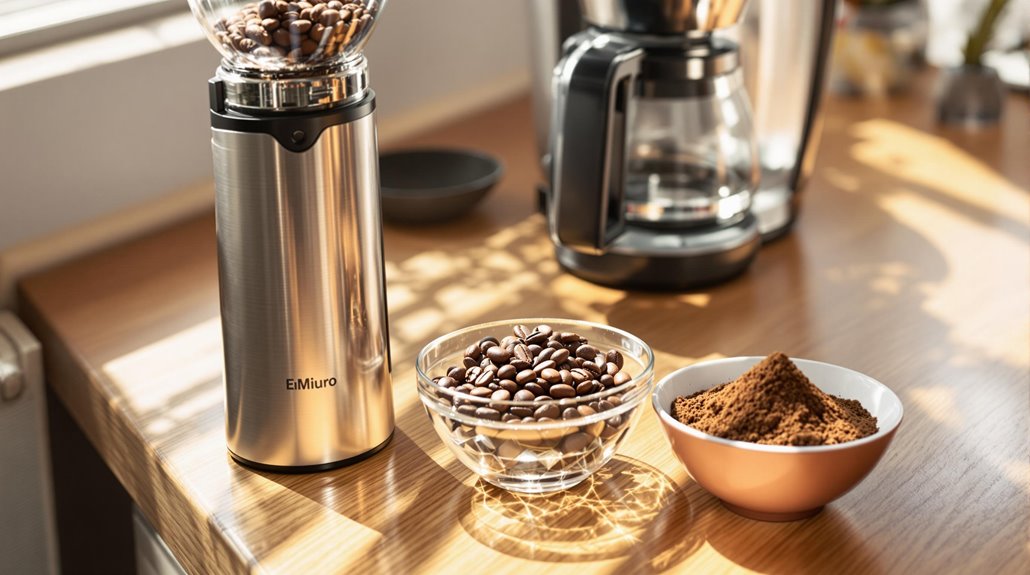
While caffeine extraction and grind size are key factors in brewing, the choice between whole beans and pre-ground coffee also hinges on convenience and preparation time. If you prioritize speed and simplicity, pre-ground coffee eliminates the need to grind, allowing you to make your brew instantly. This is ideal for busy mornings or when you lack the time or equipment to grind beans. However, pre-ground coffee sacrifices customization, as its grind size is fixed and may not suit all brewing methods.
On the other hand, whole beans require you to grind them before brewing, adding 1-2 minutes to your preparation time. While this may seem inconvenient, it offers control over grind size, ensuring ideal extraction for methods like pour-over, French press, or espresso. If you're a coffee enthusiast willing to invest the extra effort, whole beans provide a more rewarding experience. However, they demand a grinder and some expertise, making them less convenient for beginners or those seeking quick results. Ultimately, your choice depends on whether you value convenience or the ability to tailor your grind for superior flavor.
Storage and Usage Considerations
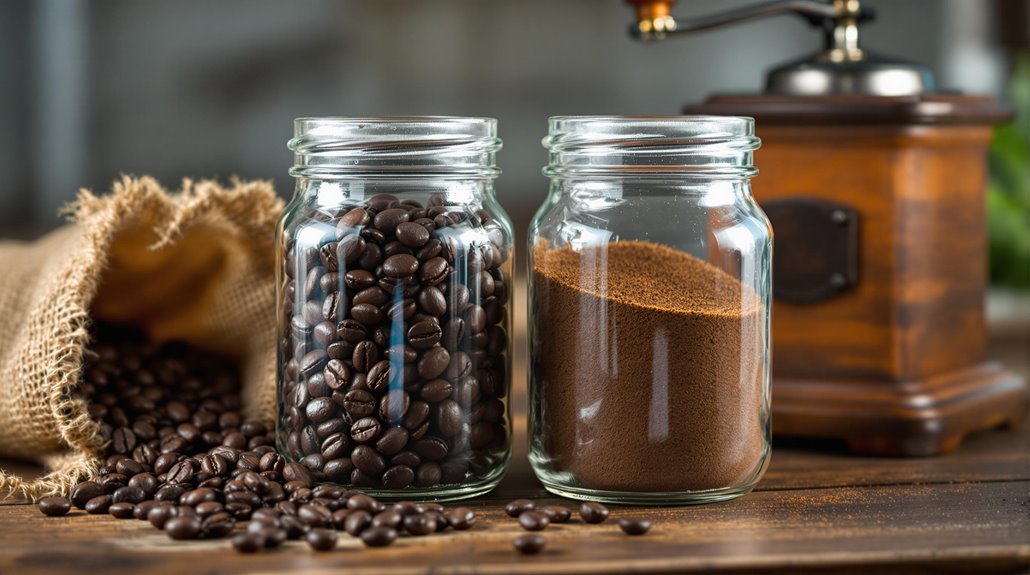
To maximize freshness, store whole beans in airtight containers away from light, heat, and moisture, or freeze them in small batches for extended shelf life. Pre-ground coffee, with its accelerated oxidation rate, should be consumed within days of opening to avoid flavor degradation, making it less suitable for infrequent use. Your brewing frequency and storage conditions will directly impact the quality and longevity of your coffee, so choose whole beans for flexibility or pre-ground for immediate consumption.
Optimal Storage Conditions
After roasting, whole bean coffee retains its peak freshness for 3-4 weeks when stored in an airtight container, shielded from light, heat, and moisture. This environment minimizes oxidation, which is the primary cause of flavor degradation. For pre-ground coffee, the surface area exposed to air increases dramatically, accelerating the loss of volatile aromatic compounds. Store pre-ground coffee in an airtight container as well, but use it within 1-2 weeks to avoid stale, flat flavors.
Freezing can extend the freshness of whole bean coffee if done correctly. Divide your beans into small, airtight batches and freeze them for up to 2-3 months. Avoid freezing pre-ground coffee, as it's prone to absorbing moisture and odors, which compromise its flavor profile. For both whole beans and pre-ground coffee, avoid frequent temperature fluctuations, as they destabilize the coffee's cellular structure and accelerate the loss of essential oils and aromatics. Always let frozen beans reach room temperature before grinding to prevent condensation. By adhering to these storage principles, you'll preserve the nuanced flavors and complexity of your coffee, whether you choose whole bean or pre-ground.
Shelf Life Comparison
Whole bean coffee's shelf-life advantage over pre-ground coffee stems from its reduced surface area exposure, which slows oxidation and preserves volatile aromatic compounds. When stored properly in airtight containers at room temperature, whole bean coffee maintains peak freshness for 7-10 days post-roast, with gradual degradation over 15-21 days. In contrast, pre-ground coffee loses freshness within 10 days due to its increased surface area, which accelerates oxidation and depletes flavor and aroma compounds. The intact structure of whole beans also retains CO2 and essential oils better, preserving the coffee's complexity. While freezing whole beans in airtight containers can extend their shelf life without compromising quality, pre-ground coffee risks flavor degradation when frozen, as its porous structure absorbs moisture and odors. Proper storage is critical for both, but whole bean coffee consistently outperforms pre-ground in freshness retention. If you prioritize flavor and aroma, whole bean coffee is the superior choice, offering a longer shelf life and better preservation of its intrinsic qualities. Pre-ground coffee, while convenient, sacrifices freshness and depth over time.
Usage Frequency Impact
Coffee's usage frequency significantly impacts its storage and freshness, with whole bean coffee offering distinct advantages for infrequent drinkers. If you're not brewing daily coffee, whole beans retain their volatile aromatic compounds and CO2 longer, preserving flavor and complexity. Pre-ground coffee tends to oxidize faster, losing its nuanced notes within weeks, even in airtight containers. For coffee lovers who consume multiple bags simultaneously, whole beans are ideal, as they maintain freshness better than pre-ground options. Ground coffee might suit those who finish a bag quickly, but for slower usage, it weakens in aroma and taste, leaving you with a flat brew. Whole beans, when stored properly, resist staling due to their intact cellular structure, which locks in oils and gasses. If you're an occasional drinker, grinding beans just before brewing guarantees peak flavor extraction. Daily coffee drinkers can still benefit from whole beans, but pre-ground coffee tends to degrade faster, even with frequent use. Ultimately, your usage frequency determines whether whole beans or pre-ground coffee aligns with your freshness expectations and brewing habits.
Brewing Flexibility and Customization
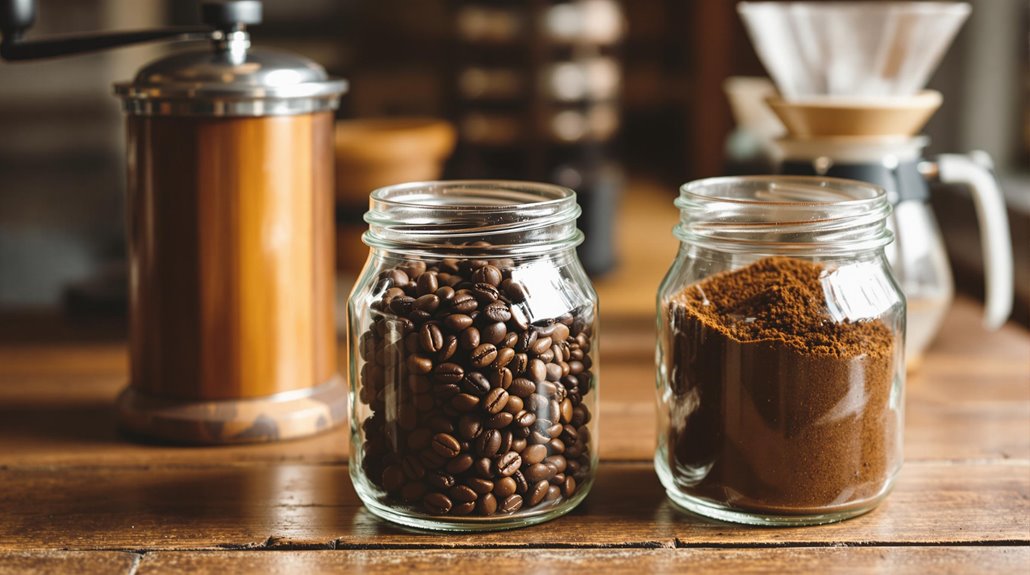
Frequently, the choice between whole bean and pre-ground coffee hinges on the level of brewing flexibility and customization you desire. Whole beans allow you to adjust the grind size to match specific brewing methods, such as espresso, French press, or pour-over, ensuring ideal extraction and flavor. Pre-ground coffee, on the other hand, is limited to a single grind size, which may not align with your preferred brewing technique, leading to sub-optimal results. By grinding whole beans at home, you can fine-tune the grind size as the coffee ages, maintaining consistent flavor over time. This adaptability is essential for achieving the perfect extraction, whether you're brewing a delicate pour-over or a robust cold brew. Whole beans also provide the flexibility to experiment with multiple brewing methods using a single bag, whereas pre-ground coffee restricts you to one grind size. For those who value precision and variety in their coffee experience, whole beans are the clear choice, offering unmatched control over grind size and brewing methods.
Disclosure: As an Amazon Associate, I earn from qualifying purchases.
